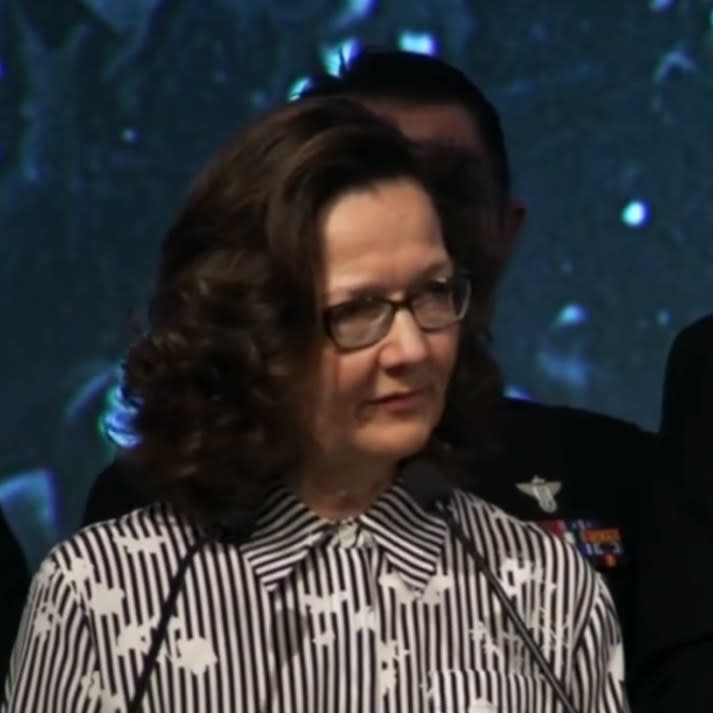No, Gina Haspel Running the CIA Would Not Be a Win for Women

In the president’s latest staff shake-up/The Apprentice: White House Edition performance art piece, Trump yesterday ousted Secretary of State Rex Tillerson, announced that he would appoint CIA director Mike Pompeo to replace him, and named 33-year CIA veteran and current deputy director Gina Haspel to take over for Pompeo. Trump was quick to note on Twitter that, if confirmed by the Senate, Haspel would be “the first woman so chosen” to run the intelligence agency.
The fact that Trump highlighted Haspel’s gender and the potentially historic nature of her appointment would suggest he’s proud of himself for selecting her. It was as if to say, “Look, I don’t just say I grab women by the pussy. Sometimes I also elevate them to very important positions in the government!” But this apparent line of thinking betrays a popular misconception about upending the power imbalance between the sexes: that simply choosing a woman—any woman—for a big job is a sign of progress. On the contrary, Haspel’s nomination may be a personal victory, but it isn’t a win for women or their civil right to be treated equal to men at work, because for one thing, Haspel is notorious for trampling on the civil rights of others.
Haspel’s selection as the nominee prompted The New York Times and others to resurface reports about Haspel that in 2002 she “oversaw the torture of two terrorism suspects and later took part in an order to destroy videotapes documenting their brutal interrogations at a secret prison in Thailand.” According to ProPublica, which cited government records, Haspel was in a leadership position as Abu Zubaydah, a Palestinian man whom the CIA mistakenly believed to be a high-level Al-Qaeda operative, was shackled to a gurney, waterboarded, deprived of sleep, and confined “for hours in a coffin-like box,” at times vomiting, urinating on himself, and losing consciousness so that medical personnel had to revive him.
“At one point, Haspel spoke directly with Zubaydah,” according to ProPublica. She even reportedly “congratulated him on the fine quality of his acting,” saying, “Good job! I like the way you’re drooling; it adds realism. I’m almost buying it. You wouldn’t think a grown man would do that.” Years later, as the Bush administration’s interrogation tactics came under fire, and some were later banned, Haspel took part in an order for the video evidence to be destroyed via a giant shredder.
But the stain remains: As pointed out by USA Today, Haspel’s record could eventually render her a wanted woman in Europe. Last year, the European Center for Constitutional and Human Rights (ECCHR) petitioned German prosecutors for an arrest warrant for Haspel based on her record of torture. “Those who commit, order, or allow torture should be brought before a court—this is especially true for senior officials from powerful nations,” ECCHR general secretary Wolfgang Kaleck said in a statement about the submission. “If the deputy director travels to Germany or Europe, she must be arrested.” The ACLU has condemned Haspel’s nomination, saying she was “up to her eyeballs in torture” and urging the CIA to “declassify and release every aspect of Haspel’s torture record before considering the nomination.”
About that: Haspel must now be confirmed in a narrowly Republican (51–47–2) Senate, and some members are already voicing their concerns. “The torture of detainees in U.S. custody during the last decade was one of the darkest chapters in American history,” said Senator John McCain, the Republican from Arizona who was tortured as a prisoner in the Vietnam War. “Ms. Haspel needs to explain the nature and extent of her involvement in the CIA’s interrogation program during the confirmation process.” Senator Tammy Duckworth, the Democrat from Illinois and an Iraq War veteran, indicated she wouldn’t vote for Haspel. “Not only did she directly supervise the torture of detainees, but she also participated in covering it up by helping to destroy the video evidence. Her reprehensible actions should disqualify her from having the privilege of serving the American people in government ever again.”
It’s not a far leap, then, to see why Haspel’s groundbreaking nomination isn’t exactly conjuring feminist warm fuzzies. As The Daily Show darkly joked on Twitter, Haspel “breaks the glass ceiling . . . over the head of a detainee.” Yes, shattering that glass ceiling is about women, a group of people who have been discriminated against and harassed, achieving equality, but not by squashing other marginalized groups to get there. This is Trump’s kind of progress: women in high places—from Kellyanne Conway to his daughter Ivanka—carrying out a man’s largely anti-woman policies and celebrating it as history. It’s why Sarah Huckabee Sanders serving as Trump’s mouthpiece and saying the women who accused the president of sexual harassment are liars isn’t the shining example of successful working motherhood I can in good conscience look up to.
Women should ask themselves what new path is Haspel creating for them to rise. Can I tell my daughter, as she learns about Sally Ride and Rosa Parks this Women’s History Month, that if she abandons her regard for others’ civil liberties, she too, can ascend to CIA director some day? That’s not progress; that’s just perpetuating the same cycle that keeps women down in the first place. Some agree with former CIA director John Brennan, who said this week that Haspel has “a lot of integrity. She has tried to carry out her duties at CIA to the best of her ability, even when the CIA was asked to do some very difficult things in very challenging times.” This would imply that Haspel knew better than what her ugly record shows. But blindly taking orders even if you believed they were wrong—dangerously, and even criminally, wrong—as opposed to standing up and fighting for what you believe is right? That doesn’t sound like a trailblazer to me.

